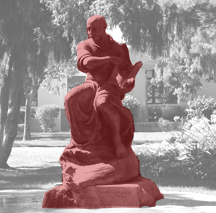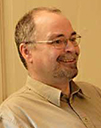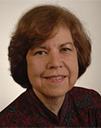
|
|
|
|
|
Class Prep
|
|
|
|
Entering a Story: The Ignatian Exercises,
the Ignatian University
 Our second context for the study of religion this quarter is the university itself. Santa Clara is the oldest college in California, founded by the Society of Jesus in 1851. The Society of Jesus, or "Jesuits," were themselves founded by Ignatius (1491–1556), a 16th century Spanish soldier who had a conversion experience while recovering from terrible leg injuries sustained in battle. The only reading materials in the hospital were the Bible and devotional literature about Christian holy folk, and these inspired him to change his life and develop his spiritual exercises. The exercises encourage people to read a biblical story and imagine what it would be like to be one or more of the characters in it. This kind of imagination, coupled with daily discernment of one's choices, provided a way to activate or "exercise" one's spirit—one's memory, understanding, and will. Our second context for the study of religion this quarter is the university itself. Santa Clara is the oldest college in California, founded by the Society of Jesus in 1851. The Society of Jesus, or "Jesuits," were themselves founded by Ignatius (1491–1556), a 16th century Spanish soldier who had a conversion experience while recovering from terrible leg injuries sustained in battle. The only reading materials in the hospital were the Bible and devotional literature about Christian holy folk, and these inspired him to change his life and develop his spiritual exercises. The exercises encourage people to read a biblical story and imagine what it would be like to be one or more of the characters in it. This kind of imagination, coupled with daily discernment of one's choices, provided a way to activate or "exercise" one's spirit—one's memory, understanding, and will. -
- The first article for today's class is written by our University President, Kevin O'Brien, S.J. It's from a book guiding people in Ignatius' exercises, but we will just read his account of Ignatius' life and then Fr. O'Brien's first work when he was just entering the Jesuits—in a palliative care center of a Bronx hospital, caring for the terminally ill. As you read these excerpts, be able to answer the following questions:
-
- The motto of the Jesuits is Ad Majorem Dei Gloriam, a Latin phrase that means "for the greater glory of God." How does that goal match up with Ignatius' earlier path in life? How did his path to glory change after his injury?
- Why or how would work with the terminally ill as a hospital orderly be a fitting training ground for a Jesuit's religious vocation?
-
- In the second reading for today, Philip Endean will introduce you to Ignatius' way of reflecting on the Bible. Ignatius described reading the Bible as a "colloquy" or kind of conversation, whereby you would not just read the story but imagine yourself in it, as one of the characters. Ignatius thought that you could motivate yourself more fully if you felt and imagined the situation, and didn't just skim over it. He wanted people to let the reading challenge them—to let the reading "engage you where you are growing." When you're done reading his article, read the primary text for today—the first two chapters of the Gospel of Luke. These chapters are about the annunciation and birth of Jesus, the "founder" of Christianity. The author of the gospel is telling us something important about the priorities of God by the way he narrates the story.
-
- Focus on the account of the birth of Jesus in Luke chapter 2:1-20. Imagine yourself as one of the characters in that story. What feelings, what inner knowledge of yours, are evoked by the story? These may be feelings of consolation (a positive, consoling feeling) or desolation (a negative, critical or empty feeling)—both are equally useful because they tell us something about ourselves. Write a few sentences on what struck you and what feelings were evoked, and try to explore why you felt that way.
- Is there any relationship you can see between the way Luke describes Jesus' birth and Fr. O'Brien's account of his hospital work?
-
-
- Assigned Readings
-
- Primary: Gospel of Luke 1–2
-
- Secondary: Kevin O’Brien, excerpts from The Ignatian Adventure: Experiencing the Spiritual Exercises of Saint Ignatius in Daily Life (Chicago: Loyola Press, 2011) 1-11, 33-36; Philip Endean, "The Bible in Personal Formation: A Dialogue. I, One Catholic Approach: The Ignatian Exercises," Contact 150 (2006) 40-43 (both on Camino); online class prep
-
- Optional: Barbara J. Fleischer, "The Ignatian Vision for Higher Education: Practical Theology," Religious Education (1993) 255-72
-
- Slides for Lecture
-
-
- Today's Author
-
| |
 |
Kevin O'Brien is the 29th President of Santa Clara University. Originally from Montreal, Quebec, he spent most of his childhood in southern Florida. He earned a B.A. in government from Georgetown, and went to law school with a plan to enter politics, but decided instead to enter the Society of Jesus in 1996 and went on to serve as Vice President for Mission and Ministry at Georgetown University, and then four years as the Dean of the Jesuit School of Theology of Santa Clara University, located up the road in Berkeley. |
| |
 |
Philip Endean is a Jesuit who studied at Campion Hall, Oxford and has served as a lecturer in systematic and pastoral theology at Heythrop College, University of London and as a tutor at Campion Hall, Oxford. He has written the book Karl Rahner and Ignatian Spirituality (Oxford University Press, 2004), served as editor of The Way (the British Jesuits' journal on Spirituality), and has served in a variety of other academic and pastoral positions. |
| |
 |
Barbara Fleischer is an Associate Professor of Pastoral Studies, Emerita, associated with the Loyola Institute for Ministry in New Orleans. She is an organizational psychologist, and has consulted with churches, social service agencies and other non-profits. In addition, she has published several articles and the book, Facilitating for Growth: A Guide for Scripture Study Groups and Small Christian Communities (Collegeville, Minnesota: Liturgical Press, 1993). |
-
-
- Further Reading
-
- Flanagan, Joseph. "The Jesuit University as a Counter-Culture." Budhi: A Journal of Ideas and Culture 2:2 (1998) 229-45. Online, http://journals.ateneo.edu/
ojs/index.php/budhi/article/view/496/498, accessed 19 September 2017.
-
- O'Malley, John W. "Renaissance Humanism and the Religious Culture of the First Jesuits." Heythrop Journal 31:4 (1990) 471-87.
-
- Traub, George W. A Jesuit Education Reader. Chicago: Loyola Press, 2008.
-
-
-
- Acknowledgements
-
|
|
|
|
|
